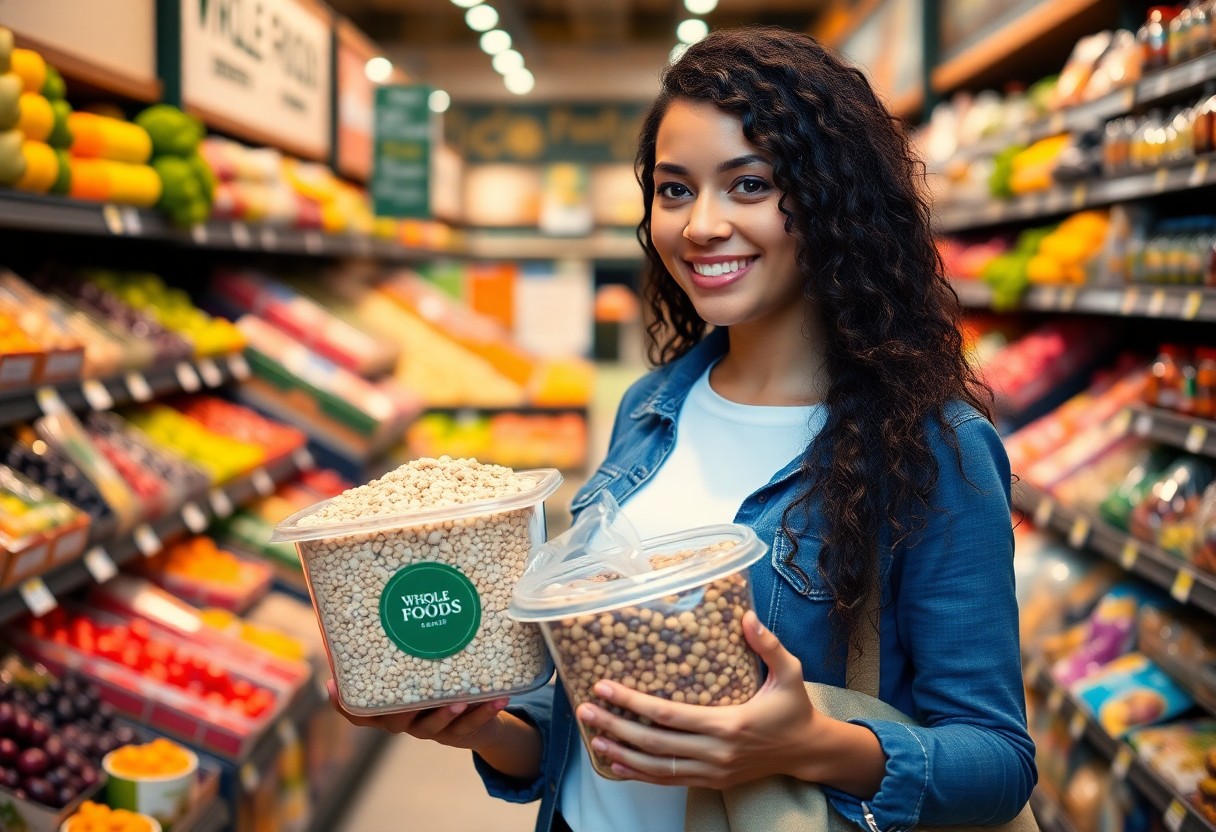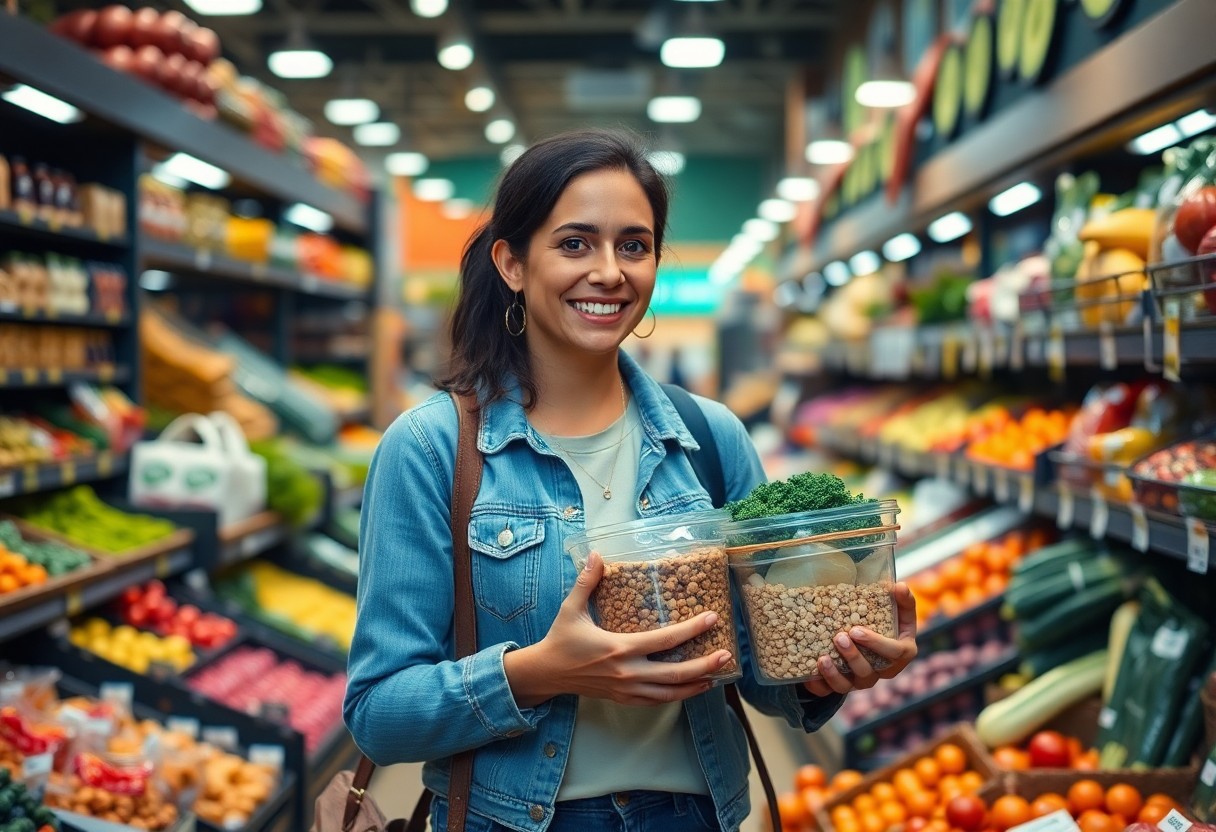Most shoppers at Whole Foods want to reduce waste and save money by using their own containers, but it’s crucial to understand the store’s guidelines.
You can bring your own containers for products typically sold by weight, such as grains, nuts, and bulk liquids, but make sure your containers are clean and dry.
Some locations may even offer discount incentives for doing so. However, not all items are eligible for personal containers, and you must be aware of the store’s specific policies to avoid any inconvenience during your shopping experience.
Key Takeaways:
- Whole Foods allows customers to bring their own containers for bulk items and certain prepared foods, promoting sustainability and reducing plastic waste.
- Containers must be clean, dry, and suitable for the food items being purchased, and they should be weighed by store staff prior to filling to ensure accurate pricing.
- Policies may vary by location, so it’s recommended to check with your local Whole Foods for specific guidelines on bringing your own containers.
Whole Foods’ Policy on Personal Containers
Although Whole Foods encourages sustainability, you should familiarize yourself with their policy on bringing personal containers. While some locations may allow it, availability varies by store and local health regulations. Always check with your local Whole Foods for specific updates, as adherence to these guidelines ensures a safe and efficient shopping experience for everyone.
Acceptable Container Types
Container types you can bring to Whole Foods include:
- Glass jars
- Plastic containers
- Reusable bags
- Cloth bags
- Stainless steel containers
Assume that all containers should be clean and suitable for food storage.
| Container Type | Notes |
|---|---|
| Glass Jars | Must be clean and dry. |
| Plastic Containers | No cracks or damage permitted. |
| Reusable Bags | Should be food-grade material. |
| Cloth Bags | Best for dry goods. |
| Stainless Steel Containers | Ideal for hot or cold items. |
Restrictions and Guidelines
Any personal container used at Whole Foods must comply with specific restrictions. You need to ensure that your containers are free from any strong odors, thoroughly clean, and void of any visible food residue. Containers that are not specifically designed for food storage may be denied use due to safety concerns.
Hence, adhering to these restrictions helps maintain food safety standards and allows Whole Foods to provide a positive shopping experience. If your container does not meet these requirements, it may be rejected at checkout. Always inspect your containers for damage, as cracked or dirty containers may compromise food safety. By doing so, you support the store’s efforts in promoting a sustainable shopping environment.
Benefits of Bringing Your Own Container
It is increasingly common for shoppers to bring their own containers to Whole Foods, and doing so offers several compelling benefits. Not only can you enjoy the satisfaction of reducing waste, but you also have the flexibility to choose the amount of food you want—without excess packaging. Ultimately, bringing your own container is a step towards a healthier planet and a more personalized shopping experience.
Environmental Impact
Among the various advantages of bringing your own container, the most significant is the positive environmental impact. By opting for reusable containers, you actively contribute to reducing plastic waste and lessening your carbon footprint. This simple act helps promote sustainability and can inspire others to adopt eco-friendly practices.
Cost Savings
Container savings can add up significantly over time, as reusing your containers eliminates the need to purchase single-use packaging. By bringing your own containers to Whole Foods, you save money while shopping sustainably.
Understanding the financial benefits of bringing your own containers is vital in today’s budget-conscious world. Many grocery stores, including Whole Foods, have policies that allow you to shop in a more economical manner by reducing costs associated with packaging. Additionally, by weighing products in your own containers, you can often buy in bulk, leading to further savings on your overall grocery bill. This makes it an appealing choice both for your wallet and the environment.

How to Properly Use Your Container at Whole Foods
Not just any container will do; you need to ensure that your vessel is clean and suitable for food items. Whole Foods encourages you to bring your own reusable containers, but make sure they are made from safe materials that won’t leach harmful substances into your food.
Hygiene and Safety Procedures
Before you use your container, it is important to wash and sanitize it thoroughly. This helps to eliminate any potential contaminants and ensures that your food remains safe to eat. Whole Foods staff may also check your container at the store to comply with safety regulations.
Filling Your Container Correctly
Against popular belief, you cannot just fill your container with any product indiscriminately. It’s best to choose items that are appropriate for the container size and to avoid overly messy products that could spill or leak.
In addition, when filling your container, always start with a clean surface and use utensils provided in-store to prevent cross-contamination. Ensure that your container is not overfilled, as this can lead to spills and compromise food safety. Check for the appropriate labeling of items; pay attention to bulk bin guidelines and weight requirements. Lastly, never fill your container with items that can easily spoil or mix, keeping separate ingredients in mind for the best quality.

FAQs About Using Personal Containers
Now that you’re considering bringing your own containers to Whole Foods, you might have questions about how to navigate this sustainable shopping option. From health and safety concerns to the store’s policies, understanding the FAQs can help you feel confident about using personal containers at your local store.
Common Concerns
Using personal containers often raises concerns about hygiene and safety. Many customers worry about potential contamination or if their containers will be accepted. It’s always a good idea to ensure your containers are clean and suitable for food storage. Whole Foods aims to support your eco-friendly choices while also prioritizing food safety.
Expert Recommendations
About using personal containers at Whole Foods, industry experts suggest that you opt for containers made of food-safe materials, such as glass or stainless steel, to prevent leaching and maintain food quality. Make sure your containers are thoroughly cleaned before use to avoid contamination issues, and check with the store staff regarding their specific policies.
This guidance is imperative for ensuring a safe and enjoyable shopping experience. By choosing non-toxic containers and practicing good hygiene, you not only protect yourself but also contribute to a more sustainable environment. Furthermore, aligning with Whole Foods’ standards will make your experience smoother, so don’t hesitate to ask staff for assistance if you have questions or need clarification regarding their regulations.
Alternative Options for Packaging
To reduce waste while shopping, consider exploring alternative packaging options. Whole Foods provides a variety of solutions that ensure you can still enjoy your favorite products while being environmentally conscious. From store-provided containers to other eco-friendly options, you have choices that align with your sustainability goals.
Store Provided Containers
Store provided containers are available at Whole Foods for customers who wish to minimize their waste. These containers can often be used for bulk items, deli meats, or salads, giving you an opportunity to shop with less plastic. Just ask a team member for assistance in using these reusable options.
Other Eco-Friendly Solutions
Across Whole Foods, you might find various eco-friendly solutions that enhance your shopping experience. These include bins for compostable waste, paper bags, or even shopping carts designed to hold your reusable bags. Embracing these options enables you to contribute positively to the environment.
At Whole Foods, you can also find reusable bags made from recycled materials, which are another great alternative to single-use plastic bags. Investing in stainless steel or glass containers for meal prep can further help in reducing your carbon footprint. Additionally, look for bulk bins for products like grains, nuts, and spices, which allow you to fill your own containers, reducing packaging waste significantly. By choosing these options, you will not only make purchase decisions that positively affect the Earth but also enjoy your shopping experience.
Customer Experiences and Feedback
Your experiences at Whole Foods with reusable containers can vary greatly. Many customers appreciate the store’s eco-friendly initiative, often sharing exciting stories of successful trips where they effectively used their containers. These testimonials highlight not only personal satisfaction but also the environmental impact of their choices.
Positive Testimonials
With numerous patrons praising Whole Foods for allowing the use of personal containers, many share that it has made their shopping more sustainable. They often express joy at contributing to reducing waste, stating how simple the process is when staff members are supportive and accommodating.
Challenges Faced by Shoppers
Along with positive experiences, some shoppers encounter obstacles when bringing their own containers to Whole Foods. Issues like measuring discrepancies and store policies can complicate the shopping process.
To navigate these challenges, you may face inconsistencies in employee knowledge regarding container policies. Some staff members might be less familiar with the correct procedures for using personal containers, leading to confusion. Additionally, cleaning and sanitizing requirements may vary, which could cause delays at the checkout. It’s vital to confirm with store employees and ensure your containers meet the specific guidelines outlined by the store to avoid any inconvenience during your shopping experience.
Summing up
Presently, you can bring your own container to Whole Foods for certain products, as the store actively supports sustainable practices. However, it’s important to check the specific guidelines of your local store, as policies may vary. Make sure your container is clean and suitable for the items you intend to purchase. By preparing in advance, you can enjoy a more eco-friendly shopping experience while adhering to Whole Foods’ safety standards.